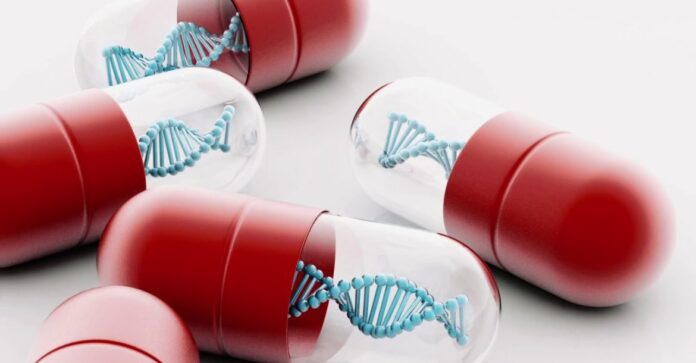By: FIP
Published in the International Pharmaceutical Federation
May 14, 2019
Harriet Pike reports from a congress session that focuses on transforming patient outcomes through pharmacogenomics. Offering a pharmacogenomics service through community pharmacies has helped Fabio De Rango establish loyalty among his customers in Ontario, Canada. “Services allow me to sit down with my patients and develop a relationship,” he told congress participants.
Pharmacogenomics is the science of how an individual’s genes can affect his or her response to drugs, Mr. De Rango explained. “If we metabolize a drug too quickly, it’s not going to work for us,” he said. With predictive modeling, pharmacogenomics allows healthcare professionals to personalize treatments, helping to avoid or mitigate side effects, improve adherence, and improve outcomes. Mr. De Rango highlighted guidelines produced by the Clinical Pharmacogenetics Implementation Consortium (CPIC) that translate genetic test results into prescribing recommendations for affected drugs before sharing the findings from a study that explored the feasibility of offering pharmacogenetic testing through community pharmacies. The study was conducted across two pharmacies and recruited 100 patients. Pharmacists were trained through webinars, small group interactive sessions, and weekly clinic training sessions with geneticists. However, all training is now available online through two modules. “As the technology gets better, everything is becoming easier and more accessible,” he said.
Patients were selected for screening if they were switching between medicines, experiencing adverse side effects regularly, or starting a new, expensive medicine. Patients were invited for review and a cheek swab was taken that was sent for testing. Results were returned with a report, providing insight into the patient’s inherited drug metabolic profile, along with recommendations for action. “The report doesn’t replace clinical judgment,” said Mr. De Rango. “It gives you a tool to use when you are talking to the patient.”
Findings showed that patients were taking a mean of 4.9 medicines for chronic conditions. A total of 119 drug therapy problems (DTPs) were identified through pharmacogenomics testing, with an additional 56 DTPs identified after pharmacists had reviewed patients’ medicines. This equated to an average of 1.9 DTPs per patient. Pharmacist recommendations included change in therapy (60.3%), dose adjustment (13.2%), discontinuation of a drug (4.4%), and increased monitoring (22.1%).
Meaningful impact
Mr. De Rango shared several case studies highlighting the impact of the service. One patient chronically infected with Helicobacter pylori was found to be an ultrafast metabolizer of the proton pump inhibitor pantoprazole. As a result, the pharmacist was able to recommend a switch to ranitidine, an H2-receptor antagonist.
Another patient had experienced intolerable side effects when treated with paroxetine for anxiety and depression. The patient’s psychiatrist prescribed low-dose escitalopram instead to reduce the risk of side effects. A month later, the physician added lorazepam to help with the patient’s anxiety because she had received little benefit from low-dose escitalopram. Subsequent pharmacogenomics testing showed that the patient was not only a poor metabolizer of paroxetine but an extensive metabolizer of escitalopram. On the pharmacist’s advice, the psychiatrist increased the dose of escitalopram.
“The main challenge associated with pharmacogenomic testing is the education of physicians and patients.”
Each test costs Mr. De Rango CAD 179 and he charges patients CAD 249. “Most patients have to pay out of their own pockets, so it’s not for everyone,” he said. Take up averages around one patient per week in each of his three pharmacies. According to Mr. De Rango, the main challenge associated with pharmacogenomics testing is the education of physicians and patients. “You need a relationship with the physician if you want them to make changes,” he said.
Next generation sequencing
Jill Kolesar, of the University of Kentucky, USA, shared her experiences of setting up molecular tumor boards (MTBs)within universities as part of precision medicine programs in the USA. MTBs assist with testing and interpretation of tumor DNA sequencing reports, which can be overwhelming for the physicians treating the patients, she explained.
The pharmacist-led MTB at the University of Kentucky Markey Cancer Center is an interdisciplinary team of medical oncologists, molecular pathologists, radiologists, pharmacists, genetic counselors, and basic scientists. Patients are referred to the pharmacogenomics service and their tumors are sequenced. The MTB meets twice monthly to review cases and make recommendations. The physicians treating patients are told the reason for the recommendation and the strength of the evidence behind it.
A study looking at outcomes from the MTB at WisconsinUniversity showed that for their first 38 patients, 32recommendations were made. Of these, nine were accepted, 11were not accepted, and in 12 cases the treating physician was waiting for the patient to progress. “If we recommend off-label therapy to target a particular mutation, that’s accepted maybe40% of the time,” Dr. Kolesar said. “If we recommended a local clinical trial . . . that was a reasonable recommendation, but a aclinical trial out of state — nobody took us up on that recommendation because patients were not interested in traveling.” Barriers to providing the service include determining what tests to use, cost, and interpretation of results. “We don’t have any practice guidelines yet,” she said.
In terms of testing, the MTBs tend to use large panels that are commercially available. Panels contain a select set of genes or gene regions that have known or suspected associations with the disease or phenotype under study and differ in terms of how complicated the reports are. “If you’re setting up this service, my advice is to know what genes are on the panel. Go with a well-established commercial vendor.”
Dr. Kolesar pointed out that next-generation sequencing is considered standard of care in the United States for a number of diseases, including locally advanced or metastatic non-small cell lung cancer and newly diagnosed colon cancer, and for any patient without standard treatment options.“If it’s not widespread in your country, it’s certainly coming,” she said.
Source: https://www.fip.org/Implementing-a-pharmacogenomics-service-within-community-pharmacy
Image Source: galusaustralis.com
Analysis:
This article was interesting because it showed how Pharmacogenomics can allow medical professionals to give a more accurate prescription to a patient based on how their body metabolizes. This was interesting to know that even when a person takes medication the right way, the way that our bodies process the things we consume varies and this variation can cause the medication to work more or less effectively.





This was an awesome article that provides data to support finds on patients metabolizing medications at various rates which can lead to ineffectiveness. By addressing this particular approach pharmacists are able to create a further connection and build a relationship with their patient through means of knowing how they will respond to prescribed drugs. Therefore, having such personal information, will tell a pharmacist what medication the individual will truly need to promote success in treating the patients health.